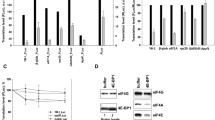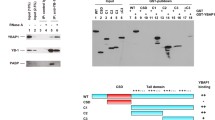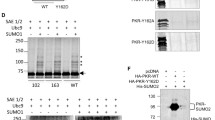Abstract
The Y box-binding protein 1 (YB-1) is a DNA/RNA-binding protein that regulates mRNA transcription and translation. It is a major component of free messenger ribonucleoprotein particles and, at higher concentrations, blocks protein synthesis. In chicken embryo fibroblasts, overexpression of YB-1 confers a specific resistance to oncogenic cellular transformation by phosphoinositide 3-kinase (PI3K) or Akt/PKB. Recent studies have identified YB-1 as a direct substrate of Akt. The functional significance of Akt-mediated phosphorylation remains largely unknown. We generated YB-1 mutants in the Akt phosphorylation consensus sequence to explore the effect of phosphorylated YB-1 in PI3K-induced transformation. In contrast to wild-type YB-1, the phosphomimetic S99E mutant no longer interferes with cellular transformation. This mutant has reduced affinity for the cap of mRNAs and fails to inhibit cap-dependent translation. The data suggest that phosphorylation by Akt disables the inhibitory activity of YB-1 and thereby enhances the translation of transcripts that are necessary for oncogenesis. Overexpression of wild-type YB-1 overrides inactivation by Akt and maintains inhibition of protein synthesis and resistance to transformation.




Similar content being viewed by others
Abbreviations
- CEF:
-
chicken embryo fibroblasts
- PI3K:
-
phosphoinositide 3-kinase
- mRNP:
-
messenger ribonucleoprotein particle
- PAGE:
-
polyacrylamide gel electrophoresis
- YB-1:
-
Y box-binding protein 1
References
Aoki M, Batista O, Bellacosa A, Tsichlis P, Vogt PK . (1998). The Akt kinase: molecular determinants of oncogenicity. Proc Natl Acad Sci USA 95: 14950–14955.
Aoki M, Blazek E, Vogt PK . (2001). A role of the kinase mTOR in cellular transformation induced by the oncoproteins P3k and Akt. Proc Natl Acad Sci USA 98: 136–141.
Aoki M, Schetter C, Himly M, Batista O, Chang HW, Vogt PK . (2000). The catalytic subunit of phosphoinositide 3-kinase: requirements for oncogenicity. J Biol Chem 275: 6267–6275.
Bader AG, Felts KA, Jiang N, Chang HW, Vogt PK . (2003). Y box-binding protein 1 induces resistance to oncogenic transformation by the phosphatidylinositol 3-kinase pathway. Proc Natl Acad Sci USA 100: 12384–12389.
Bader AG, Kang S, Zhao L, Vogt PK . (2005). Oncogenic PI3K deregulates transcription and translation. Nat Rev Cancer 5: 921–929.
Bader AG . (2006). YB-1 activities in oncogenesis: transcription and translation. Curr Cancer Ther Rev 2: 31–39.
Bader AG, Vogt PK . (2005). Inhibition of protein synthesis by Y box-binding protein 1 blocks oncogenic cell transformation. Mol Cell Biol 25: 2095–2106.
Basaki Y, Hosoi F, Oda Y, Fotovati A, Maruyama Y, Oie S et al. (2006). Akt-dependent nuclear localization of Y-box-binding protein 1 in acquisition of malignant characteristics by human ovarian cancer cells. Oncogene 26: 2736–2746.
Bergmann S, Royer-Pokora B, Fietze E, Jurchott K, Hildebrandt B, Trost D et al. (2005). YB-1 provokes breast cancer through the induction of chromosomal instability that emerges from mitotic failure and centrosome amplification. Cancer Res 65: 4078–4087.
Bouvet P, Matsumoto K, Wolffe AP . (1995). Sequence-specific RNA recognition by the xenopus Y-box proteins. An essential role for the cold shock domain. J Biol Chem 270: 28297–28303.
Chang HW, Aoki M, Fruman D, Auger KR, Bellacosa A, Tsichlis PN et al. (1997). Transformation of chicken cells by the gene encoding the catalytic subunit of PI 3-kinase. Science 276: 1848–1850.
Evdokimova V, Ruzanov P, Anglesio MS, Sorokin AV, Ovchinnikov LP, Buckley J et al. (2006). Akt-mediated YB-1 phosphorylation activates translation of silent mRNA species. Mol Cell Biol 26: 277–292.
Evdokimova V, Ruzanov P, Imataka H, Raught B, Svitkin Y, Ovchinnikov LP et al. (2001). The major mRNA-associated protein YB-1 is a potent 5′ cap-dependent mRNA stabilizer. EMBO J 20: 5491–5502.
Jurchott K, Bergmann S, Stein U, Walther W, Janz M, Manni I et al. (2003). YB-1 as a cell cycle-regulated transcription factor facilitating cyclin A and cyclin B1 gene expression. J Biol Chem 278: 27988–27996.
Kloks CP, Spronk CA, Lasonder E, Hoffmann A, Vuister GW, Grzesiek S et al. (2002). The solution structure and DNA-binding properties of the cold-shock domain of the human Y-box protein YB-1. J Mol Biol 316: 317–326.
Minich WB, Ovchinnikov LP . (1992). Role of cytoplasmic mRNP proteins in translation. Biochimie 74: 477–483.
Sorokin AV, Selyutina AA, Skabkin MA, Guryanov SG, Nazimov IV, Richard C et al. (2005). Proteasome-mediated cleavage of the Y-box-binding protein 1 is linked to DNA-damage stress response. EMBO J 24: 3602–3612.
Stenina OI, Shaneyfelt KM, DiCorleto PE . (2001). Thrombin induces the release of the Y-box protein dbpB from mRNA: a mechanism of transcriptional activation. Proc Natl Acad Sci USA 98: 7277–7282.
Sutherland BW, Kucab J, Wu J, Lee C, Cheang MC, Yorida E et al. (2005). Akt phosphorylates the Y-box binding protein 1 at Ser102 located in the cold shock domain and affects the anchorage-independent growth of breast cancer cells. Oncogene 24: 4281–4292.
Acknowledgements
We thank L Ueno for technical assistance in tissue culture. This work was supported by grants from the National Cancer Institute. This is manuscript number 18882-MEM of The Scripps Research Institute.
Author information
Authors and Affiliations
Corresponding author
Rights and permissions
About this article
Cite this article
Bader, A., Vogt, P. Phosphorylation by Akt disables the anti-oncogenic activity of YB-1. Oncogene 27, 1179–1182 (2008). https://doi.org/10.1038/sj.onc.1210719
Received:
Revised:
Accepted:
Published:
Issue Date:
DOI: https://doi.org/10.1038/sj.onc.1210719
- Springer Nature Limited
Keywords
This article is cited by
-
YB-1 activating cascades as potential targets in KRAS-mutated tumors
Strahlentherapie und Onkologie (2023)
-
RSK-mediated nuclear accumulation of the cold-shock Y-box protein-1 controls proliferation of T cells and T-ALL blasts
Cell Death & Differentiation (2017)
-
Akt-mediated phosphorylation controls the activity of the Y-box protein MSY3 in skeletal muscle
Skeletal Muscle (2015)
-
The role of cold shock domain proteins in inflammatory diseases
Journal of Molecular Medicine (2014)
-
The feed-forward loop between YB-1 and MYC is essential for multiple myeloma cell survival
Leukemia (2013)




